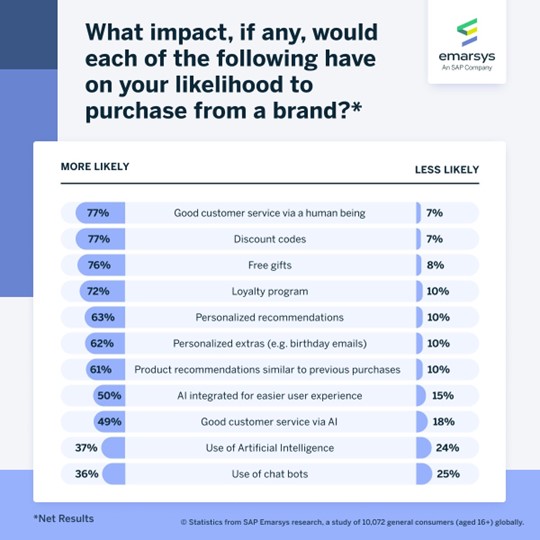Artificial intelligence (AI) and data have become the gravitational force to a retailer’s success, and it is critical for brands to communicate to consumers how information is leveraged to enhance their customer experiences.
Intelligent customer experience (CX) made its grand debut at this year’s SAP Sapphire and ASUG Annual Conference to an enthusiastic crowd of customers, partners, reporters, and analysts.
Even before seeing the audience’s excitement at my keynote product demo, I knew we were bringing something special to the stage because intelligent CX is rooted in unique industry needs, connected across departments and technology systems, fueled by insightful data, and adaptive to meet the changing needs of customers and businesses. It also infuses connected operational and contextual data from across the entire enterprise with AI insights to support a seamless customer experience.
While we’ve been exploring and offering AI-driven solutions at SAP for years, I’m delighted to see the interest in this technology spike with all the recent buzz around generative AI. Even more galvanizing for me is seeing the excitement grow among businesses like Swarovski, the world’s premier jewelry and accessories brand, which is tapping into the power of AI to create deeper connections with its customers.
“AI is undoubtedly a value driver for customers and companies, helping to elevate personalization at the highest level,” said Dr. Lea Sonderegger, CIO and chief digital officer at Swarovski. “Thanks to sophisticated algorithms, we can now better understand our customers as never before, anticipate their needs, and, recently, provide a human-like conversational interaction.”
Overall, while there is a clear business benefit for consumers to share data, the real question is: “What’s in it for them?”
Striking a Mutually Beneficial Balance for Data Sharing
Without data — the right data, and enough of it — all the AI in the world will not amount to one single meaningful insight that can help brands create the personalized experiences needed to drive business growth, provide value to consumers, and build customer loyalty.
Yet the sort of rich data that empowers industries such as retail and consumer packaged goods (CPG) to harness the capabilities of AI relies on the goodwill of customers to share their data. And not every customer is willing to give it up.
Nearly half of consumers (46%) are wary of the positive role AI plays in their retail experiences, according to a recently conducted survey of more than 10,000 consumers in the U.S., U.K., Australia, and Germany by SAP Emarsys, SAP’s omnichannel customer engagement platform.

While these consumers are apprehensive about how brands use their data, they still want to benefit from the convenience, value, and brand connection that comes from sharing it with companies. Respondents would be more likely to purchase from a brand that offers personalized extras (62%), personalized recommendations (63%), loyalty programs (72%), and discount codes (77%). Further, 76% percent of global consumers surveyed prefer personalized marketing communications from brands and 73% want to know that a brand “gets them” as a person.
These results highlight how consumer assumptions and fears regarding data sharing and AI may conflict with their desires for more individuated, value-driven experiences. Retailers can, and must, help customers make the connection between sharing data and reaping the benefits of its use.
“We currently leverage data and AI to provide personalized product recommendations on our website and in our newsletters and also in the store through our clienteling services to enhance the brand and shopping experience of our queens, our customers,” Sonderegger shared.
People are typically more amenable to sharing their data when it provides direct value — in savings, efficiency, and stronger connections with brands. But transparency is critical to building the much-needed trust between a customer and a brand. Sharing how data is being used anytime a customer creates an account, signs up for marketing communications, or agrees to data sharing reassures customers that their data is being treated securely and compliantly.
Retailers that can provide this transparency and direct value will enjoy the kind of widespread brand loyalty that comes from more personalized, value-oriented interactions, which can be the key to giving customers the brand experiences they truly want, when they want it, and where they want it.
Unlocking Customer Experience with AI
The CX innovations showcased at SAP Sapphire enable retailers to personalize these curated experiences. Customers can tap into AI-tailored touchpoints whether on the couch, the beach, in-transit, or in-store.
Across the suite, SAP CX combines trusted data and responsible AI to unlock the customer experience. Creating personalized customer experiences is a challenging and time-consuming task, but essential to achieve high customer satisfaction. SAP Digital Assistant for CX, for example, provides marketers and sellers with holistic insights and recommendations, and automatically generates personalized product content and interactions. The benefits for companies include increased sales conversions, improved customer experience from personalized interactions and product content, and up to €300,000 in expected savings for average SAP Service Cloud customers.
The portfolio also unlocks the value of intelligent CX with AI with:
- Intelligent recommendations and a seamless customer experience based on insights from commerce, sales, and service data
- More customer-centric decision-making from a single source of unified data coupled with real-time insights via SAP Customer Data Platform
- Hitch-free, personalized, real-time service and support with SAP Service Cloud based on integrated operational and customer data
- Guided selling enabled by intelligent recommendations, opportunity insights, and real-time contextual data, with generative AI-personalized messaging
From better demand forecasting to higher customer satisfaction, AI promises transformative advantages for all industries. McKinsey estimates the economic value of generative AI for the retail and consumer packaged goods industries alone at $400 to $660 billion a year. I
’m proud to say that we’re already helping our customers anticipate and rise to their customers’ expectations with embedded AI that is relevant, reliable, and responsible — but this is just the beginning. Business AI continues to evolve, and we’ll continue to anticipate consumer expectations, driving strong business outcomes, and taking customer experience from simply AI-powered to AI-empowered.
Ritu Bhargava is president and chief product officer for SAP Industry & Customer Experience.



